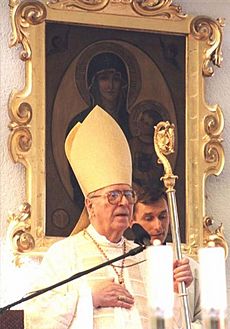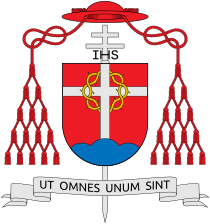Ján Chryzostom Korec facts for kids
Quick facts for kids His Eminence Ján Chryzostom Korec S.J. |
|
|---|---|
| Cardinal, Bishop Emeritus of Nitra | |
 |
|
| Church | Catholic |
| Archdiocese | Nitra |
| Enthroned | 1990 |
| Reign ended | 9 June 2005 |
| Predecessor | Ján Pásztor |
| Successor | Viliam Judák |
| Other posts | Cardinal-Priest of Santi Fabiano e Venanzio a Villa Fiorelli |
| Orders | |
| Ordination | 1 October 1950 |
| Consecration | 24 August 1951 |
| Created Cardinal | 28 June 1991 |
| Rank | Cardinal |
| Personal details | |
| Born | 22 January 1924 Bošany, Czechoslovakia (Present day Slovakia) |
| Died | 24 October 2015 (aged 91) Nitra, Slovakia |
| Nationality | Slovak |
| Motto | Ut Omnes Unum Sint |
| Coat of arms |  |
Ján Chryzostom Korec (born January 22, 1924 – died October 24, 2015) was an important Slovak Jesuit priest. He became a cardinal in the Catholic Church. He was made a priest in 1950 and a bishop in 1951.
For 39 years, he worked as a priest without the government's permission. This was because the government tried to control the Catholic Church. He spent time in prison or worked regular jobs to support himself.
In 1990, Pope John Paul II made him the Bishop of Nitra. A year later, in 1991, he became a cardinal. Korec retired in 2005 and passed away in 2015.
Contents
Early Life and Studies
Ján Chryzostom Korec was born into a working-class family. His parents worked at a leather factory in Bošany, a town in Slovakia. He had two older siblings. His family lived a simple life with few resources.
In 1939, Korec joined the Society of Jesus, a religious group of priests and brothers. He began studying Catholic theology and philosophy. These studies helped him learn about faith and deep thinking.
Life Under Communism
During Korec's studies, the communist government took control. They tried to stop religious groups. Because of this, he had to stop his philosophy studies. He became a priest in 1950.
Just one year later, in 1951, he was secretly made a bishop. He was only 27 years old, making him the youngest Catholic bishop in the world at that time. He then worked at different companies. He was a night watchman and a maintenance worker.
Imprisonment for Faith
From 1960 to 1968, Korec was put in prison. He was held in Valdice, a prison in the Czech Republic. Many other priests and bishops were also imprisoned there. They were forced to share cells with serious criminals.
While in prison, Korec continued to care for the spiritual needs of other prisoners. He later wrote a book about his experiences called Night of the Barbarians. After many requests, he was released in 1968. This happened during a general amnesty, which is like a pardon for many prisoners.
Leading the Underground Church
Even after prison, Korec faced challenges. Despite his poor health, he worked as a street cleaner and factory worker. At the same time, he secretly led the "underground Church." This meant he continued his religious work even though it was against the law.
He held spiritual retreats for students and gave advice to young people, future priests, and priests. His apartment became a secret meeting place for many people seeking spiritual guidance. Since Christian books were banned, Korec wrote samizdat books. These were books secretly printed and shared by hand. He also secretly ordained new priests. This was necessary because the government tried to limit the number of priests.
The secret police watched Korec's apartment closely. They even tried to harm him twice.
Later Life and Influence
In 1990, the Iron Curtain fell. This meant communist rule ended in Eastern Europe. After this, Pope John Paul II appointed Ján Chryzostom Korec as the Bishop of Nitra.
On May 29, 1991, Pope John Paul II made Korec a cardinal. He officially became a cardinal on June 28. He was given the title of cardinal-priest of Santi Fabiano e Venanzio a Villa Fiorelli.
In 2012, Korec had a serious health issue and was hospitalized. Doctors operated on him, and his condition was very critical. Many people were surprised when he recovered significantly.
Korec remained active in the Church and in public life. He received three special degrees from universities in the United States. He also wrote regularly for a Slovak magazine.
After communism ended, Korec became an important leader in Slovakia. He helped shape the country's social, economic, and political changes. He supported Slovakia becoming an independent country. He also worked to rebuild the Slovak Catholic Church. Many churches needed repairs, and there was a shortage of priests and teachers. He also helped improve relationships with the Jewish community.
In 1987, Korec signed a "Declaration of Apology." This was an official apology to all Jewish people in Slovakia. They had suffered greatly during World War II. The Cardinal said that the forced removal of Jewish people was "an inhumane act."
In his retirement, Korec lived in Nitra. He continued to write and give advice. In 2014, Liverpool Hope University in Britain gave him an honorary doctorate. This was for his work for freedom, democracy, and world peace.
Awards and Honors
Ján Chryzostom Korec received many awards and honorary doctorates for his strong faith and dedication. His work was recognized by universities around the world. These included the University of Notre Dame (1986), University of Sacred Heart (1992), and the Catholic University in Washington (1993). He also received honorary doctorates from Polish Cardinal Stefan Wyszynski (2003) and Liverpool Hope University (2014).
In 1993, he won a state prize from the French Republic. In 1995, he received the Rad Stur Class state award. In 1999, he was given the Order of Andrej Hlinka state award.
Criticism and Views
Some people criticized Korec because they felt he had a positive view of Jozef Tiso. Tiso was the leader of the first Slovak Republic during World War II. Critics pointed to events like the unveiling of a plaque for Tiso in 1990. They also mentioned a memorial service Korec held for Tiso. In 1997, Korec publicly defended a historian who wrote a controversial book. This book supported some policies from the first Slovak Republic period.
Writings and Books
Ján Chryzostom Korec wrote more than 80 books. His writings are a very important part of Slovak Christian literature from the 20th century. He also wrote for many secret "Samizdat" magazines. Some of his books include:
- Philosophical questions of dialectical materialism, 1947.
- The drama of atheistic humanism. Reflections on Christian spirituality.
- The origin of man, (Samizdat, 1949)
- The responsibility of Sciences, (Samizdat, 1971)
- Over the origin and development of life, (Samizdat, 1971)
- Salvation in Christ, (Samizdat, 1972)
- In the light of the Good News. (Samizdat, 1985)
- Christ the priest, (Samizdat, 1987)
- The mission of the priest, (Samizdat, 1987)
- Church amid challenges, (Samizdat, 1987)
- Church of development, (Samizdat, 1987)
- Reflections on man, Bratislava, I-II, 1992/1993 3rd ed. 1992 (formerly CA, 1986).
- Who is the man. In: (Slovak views, 1993), no. 1
- Cyril and Methodius tradition today. In: (Slovak views, 1993, no. 7)
- Philosopher of common sense. In: (Verbum, 2000, no. 4), pp. 65–88.
See also
 In Spanish: Ján Chryzostom Korec para niños
In Spanish: Ján Chryzostom Korec para niños
- Jesuit cardinal
 | Aurelia Browder |
 | Nannie Helen Burroughs |
 | Michelle Alexander |


